Film (2013)
Written and directed by Joel and Ethan Coen
With Oscar Isaac (Llewyn Davis), Carey Mulligan (Jean), Justin Timberlake (Jim), Ethan Phillips (Mitch Gorfein), Robin Bartlett (Lillian Gorfein), Max Casella (Pappi Corsicato), Jerry Grayson (Mel Novikoff), Jeanine Serralles (Joy), Adam Driver (Al Cody), Stark Sands (Troy Nelson), John Goodman (Roland Turner), Garrett Hedlund (Johnny Five), Alex Karpovsky (Marty Green), Helen Hong (Janet Fung), F. Murray Abraham (Bud Grossman)
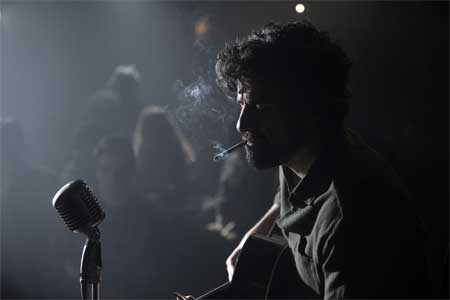
in “Inside Llewyn Davis”
Photo: Alison Rosa ©2012 Long Strange Trip LLC
Courtesy of CBS Films
Llewyn Davis (Oscar Isaac) is a struggling folksinger in Greenwich Village, New York City in the early 1960s. He is talented and has a beautiful voice, but his career is going nowhere. We watch him performing in clubs, consulting with his manager, and hanging out with various friends, and nothing seems to fall into place. A series of misadventures, one involving a runaway cat, structure his days and we watch as he navigates his tenuous habitation in material and artistic realms while they shift beneath him.
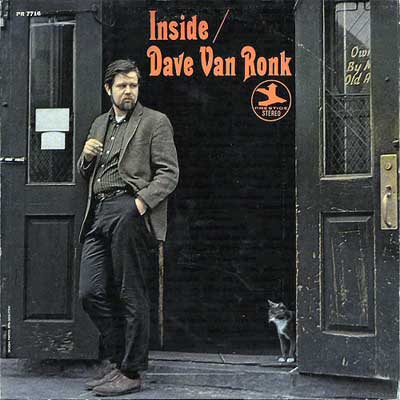
This is a funny movie, not because it is filled with intentional laughs, but because it is one long, wry setup for a punch line, with observations about talent, innovation, originality and change along the way. Using the folk music scene of the early 1960s as a vehicle, the film is a treatment of unheralded accomplishment in art. It suggests that what eventually does become popular, receives great acclaim, and leaves its artistic compadres in the dust does so because of a uniqueness of vision that captures the public imagination. That uniqueness, rather than a distinctive level of accomplishment, marks the difference in public recognition.
The Coens here recognize the unfairness of it all, noting how extremely good art sometimes gets blown away by extremely original art. But they also cast a wry glance on the whole artistic enterprise, suggesting that random luck and the madness of crowds sometimes govern the success of those who do make it. Though Llewyn Davis’ voice is beautiful and his guitar playing is great, the music scene is about to change dramatically and he is hovering on the edge of it; though appealing in so many ways, he is, tragically and unreasonably, more or less forgettable.
Along this cinematic path there are some great rides.
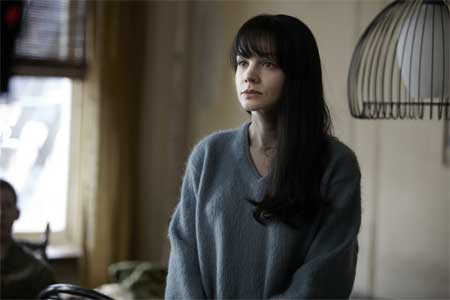
in “Inside Llewyn Davis”
Photo: Alison Rosa ©2012 Long Strange Trip LLC
Courtesy of CBS Films
Carey Mulligan gives a show stopping performance as Jean, a folksinger in the pair group Jim and Jean. Her sharp, exotic beauty is complemented by an equally sharp tongue, conveying a fury that comes across with such power and charm that it is difficult to take one’s eyes off of her.

in “Inside Llewyn Davis”
Photo: Alison Rosa ©2012 Long Strange Trip LLC
Courtesy of CBS Films
Oscar Isaac, as Llewyn Davis, has a comfortably earthy manner and a helluva sweet voice. His portrayed demeanor is considerably less gritty than Dave Van Ronk’s, which makes the two moments in the film when Davis loses it and breaks through the veneer of his composure less believable than they might be. These moments give some dramatic shape to the film, but they almost come out of nowhere. One has to pay extremely close attention to the subtleties of the narrative to understand why he might have freaked out, which makes the effect unpredictable and to weaker effect. Isaac gives a charming and musically beautiful performance, but, without strong enough support from the script, it is a little too contained to explain why Davis’ personality shows its cracks so loudly and abruptly. When Davis jeers another unsuspecting folksinger at a club or shuts up someone who tries to sing along with him around a dinner table, it just does not make enough sense.
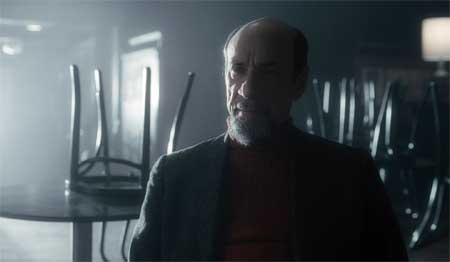
in “Inside Llewyn Davis”
Photo: Alison Rosa ©2012 Long Strange Trip LLC
Courtesy of CBS Films
John Goodman has a funny appearance as a schlubby, strung out jazz musician Roland Turner, and F. Murray Abraham has a great spot as producer Bud Grossman. It’s funny to think of Abraham’s role here in relation to his role as Antonio Salieri in Amadeus (1984), a competent but not great court composer being overtaken by Mozart. Justin Timberlake has an uncharacteristically bland role as Jim, the male part of Jim and Jean, and Adam Driver, the captivating offbeat antihero from HBO’s Girls (2012-) pitches in his charming two cents as musician Al Cody.
A lot of the supporting roles are just caricaturish enough to fill out a vivid cultural landscape. This is something of the technique they used in A Serious Man (2009), giving Inside Llewyn Davis a somewhat similar tone. There is a prevailing quietude in the story and the setting, unlike the wild Coen romps in Fargo (1996) or The Big Lebowski (1998). Restrained and wry, it sometimes makes for setups that are almost too funny for laughter.
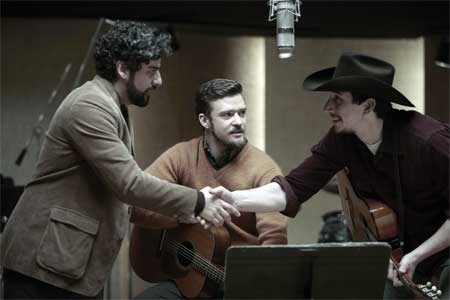
Justin Timberlake as Jim
Adam Driver as Al Cody
in “Inside Llewyn Davis”
Photo: Alison Rosa ©2012 Long Strange Trip LLC
Courtesy of CBS Films
Musically, the film is wonderful – not only in Isaac’s beautiful renditions of Van Ronk songs, but all around. The concert film, Another Day, Another Time, which grew out of the filming of Inside Llewyn Davis, is exquisite.
– BADMan
Leave a Reply